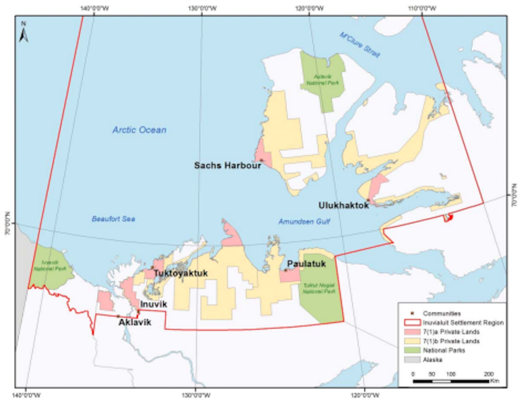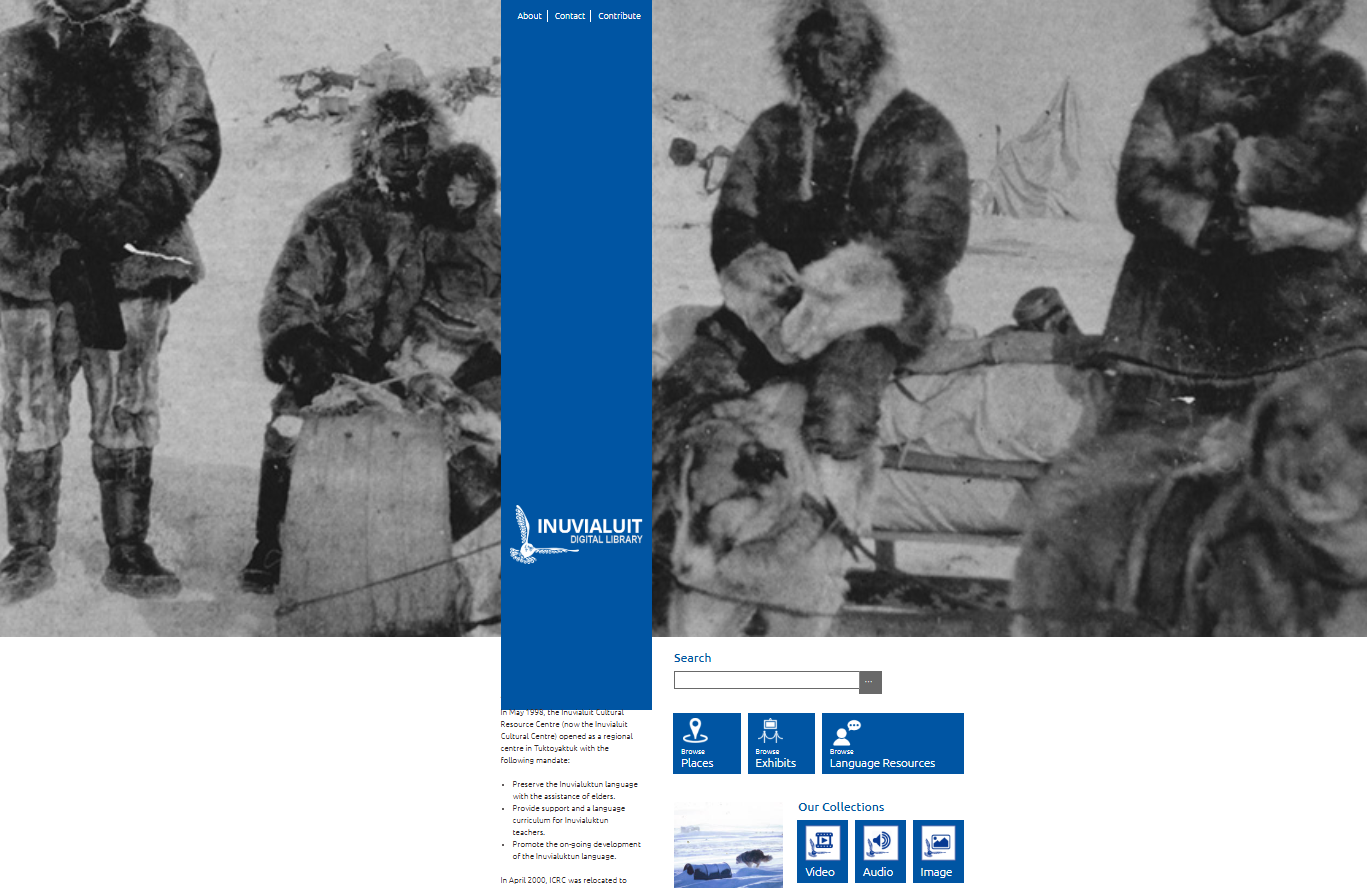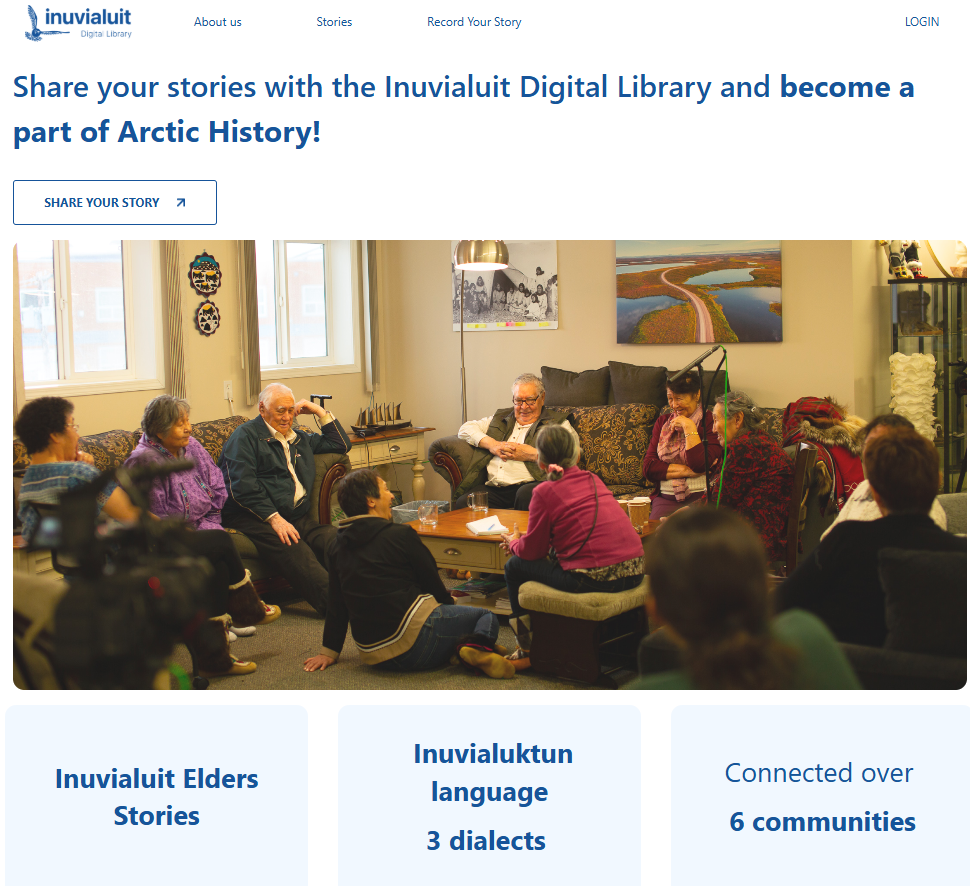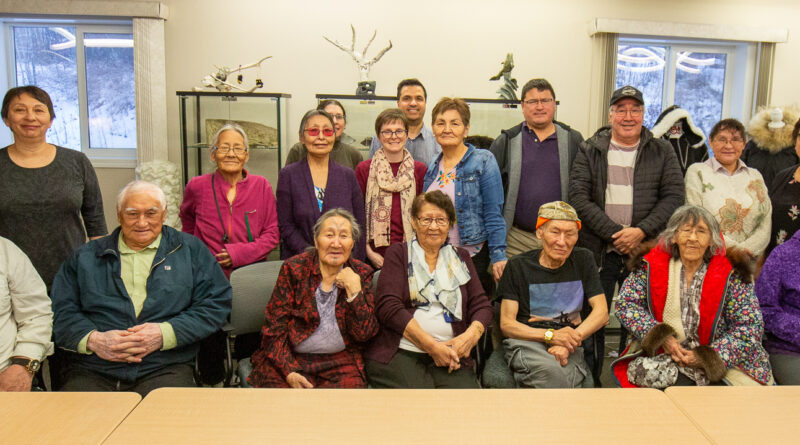Digital Self-Determination: Data Sovereignty in Inuvialuit Communities of Canada’s Western Arctic
Digital Self-Determination: Data Sovereignty in Inuvialuit Communities of Canada’s Western Arctic
Ali Shiri
Since 2013, researchers from the University of Alberta School of Library and Information Studies and the Inuvialuit elders, leaders, and community members in the Inuvialuit Settlement Region (ISR), Northwest Territories have collaborated to develop digital library and digital storytelling platforms to support Inuvialuit cultural heritage digitization, revitalization, preservation and access. During this time a series of three projects were funded by the Social Sciences and Humanities Research Council of Canada (SSHRC) to support the development of digital capabilities for Inuvialuit cultural heritage preservation and access. At the heart of this endeavor lies the Inuvialuit Cultural Centre in Inuvik, dedicated to promoting and strengthening the Inuvialuit language and culture, and providing valuable educational tools for the ISR and beyond.
—the Inuvialuit Cultural Centre is dedicated to promoting and strengthening the Inuvialuit language and culture—

The population of the ISR region is roughly 6500 persons, the majority of whom reside in the region’s capital of Inuvik. The other five communities within the region are Aklavik, Paulatuk, Sachs Harbour, Tuktoyaktuk, and Ulukhaktok. The language of the Inuvialuit is collectively known as Inuvialuktun and consists of three dialects: Uummarmiutun, meaning ‘people of the evergreens,’ spoken in Aklavik and Inuvik; Sallirmiutun, meaning ‘people closest to the shore,’ spoken in Paulatuk, Sachs Harbour, and Tuktoyaktuk; and Kangiryuarmiutun, meaning ‘people of the large bay,’ spoken in Ulukhaktok. Inuvialuktun is an endangered language, but many community initiatives and efforts are underway to ensure continued use and preservation. Informed by Indigenous and community-based research methodologies, the following three projects aimed to address the significant objective of Inuvialuit cultural and language preservation through community engagement, partnership, and collaboration.
The Inuvialuit Digital Library project (formerly known as Digital Library North) began in 2014 to gather, digitize, describe, and make accessible thousands of Inuvialuit cultural and language resources that were scattered in many physical and media formats, locations, and platforms. Publicly accessible since 2015, the Library houses more than 69 collections and 6,000 items featuring rich cultural materials—ranging from textual and image archives to language learning resources, as well as audio and video recordings of oral histories, music and dance, community events, and activities. The Inuvialuit Digital Library research and development were carried out considering several key principles and themes including culturally appropriate and responsive metadata, dynamic community-driven description framework, community information needs and behaviours, stewardship of cultural heritage, multilingual and multi-dialect user interfaces, and appropriate partnerships and relationship building. The Library is currently used for educational, research, and geneological purposes by schools, northern colleges, and universities. By adopting decolonized, community-driven approaches and innovative open-source technologies, the Inuvialuit communities were able to bridge the digital information gap and benefit from the digital preservation of their cultural heritage and language. Specific examples include determining how endangered languages and dialects from living elders and community leaders can be made digitally accessible using an array of digital media technologies, from textual and audiovisual language lessons to social media and social network platforms. In addition, examples of content from the Inuvialuit Digital Library have been used on Inuvialuit community corporation websites as well as on social media platforms.

Built on the Inuvialuit Digital Library project collaborations and relationships, the Inuvialuit Voices project aimed to create a digital storytelling platform in support of language and culture sharing and revitalization. Inuvialuit Voices was designed to make oral stories more accessible across the region and provide a means for community members to capture and preserve their elders, youth, and community stories. A key step in this project was to gain a better understanding of Inuvialuit storytelling in-context. Towards that goal, the research team organized a storytelling workshop at the Inuvialuit Cultural Centre in 2019. A total of 12 elders participated in the gathering representing the six ISR communities. Having representation from all communities in the region was important, not only to ensure the inclusion of voices from all of the communities, but also to properly represent speakers of each of the three regional dialects of Inuvialuktun (Kangiryuarmiutun, Sallirmiutun, and Uummarmiutun). The workshop was moderated by Beverly Amos, a member of the research team and Regional Language Consultant for the Cultural Centre, and most of the stories shared were told in Inuvialuktun. Beverly invited everyone to introduce themselves, tell stories of their own choice, and present topics of interest for discussion (e.g., genealogy and the pronunciation of names, preservation of language). The entirety of the workshop was photographed, recorded, and deposited into the Inuvialuit Digital Library. The uniqueness of this project lies in its design approach to develop a novel user-friendly digital storytelling platform for real-time and seamless capturing of stories and comments within an operational digital library.

The Intergenerational Digital Storytelling Mobile Application is the third project, currently underway, which aims to establish a novel community-driven participatory design methodology involving Inuvialuit elders and youth to develop a mobile application for real-time digital storytelling and capturing. Building on the Inuvialuit Digital Library and Inuvialuit Voices projects, this project aims to co-design, prototype, and co-develop a mobile application that facilitates knowledge sharing and transfer between Inuvailuit elders and youth to support language and cultural heritage revitalization in the ISR communities. The research team has recently finished the mobile application requirements gathering attending an intergenerational storytelling gathering in Inuvik in March 2025. Once the development of the Intergenerational digital storytelling mobile application is complete, it will provide accessible opportunities for all six ISR communities to capture elders and youth stories in order to enhance the collections within the Inuvialuit Digital Library.

Key lessons learned
Several important cultural, methodological, and theoretical lessons emerged from these projects, offering valuable guidance for researchers engaging with Indigenous, northern, or remote communities. Building strong research partnerships with these communities necessitates a relational, respectful, and reciprocal approach. Projects should be community-driven, co-created, and centered on addressing community needs. To foster successful and respectful collaborations, the following are essential prerequisites:
- a deep understanding of cultural, linguistic, geographic, and environmental contexts
- recognition of and learning from Indigenous knowledges and epistemologies
- respect for data, information, and knowledge governance and sovereignty, as well as intellectual property
- and active engagement with both community members and organizations
These projects demonstrate the potential power of projects that combine the knowledge and expertise of community members and information science practitioners and researchers to co-develop knowledge creation and sharing tools that are responsive to the needs and interests of the community.
Cite this article in APA as: Shiri, A. Digital self-determination: Data sovereignty in Inuvialuit communities of Canada’s Western Arctic. (2025, April 28). https://informationmatters.org/2025/04/digital-self-determination-data-sovereignty-in-inuvialuit-communities-of-canadas-western-arctic/
Author
-
Ali Shiri is a Professor in the School of Library and Information Studies at the University of Alberta, Edmonton, Alberta, Canada, and is currently serving as the Vice Dean of the Faculty of Graduate & Postdoctoral Studies. He received his PhD in Information Science from the University of Strathclyde Department of Computer and Information Sciences in Glasgow, Scotland in 2004. He has been teaching, researching, and writing about digital libraries, digital information interaction, data and learning analytics, and more recently on the responsible and ethical use of generative AI in higher education. In his current research, funded by the Social Sciences and Humanities Research Council of Canada (SSHRC), he is developing mobile applications for cultural heritage digital libraries and digital storytelling systems for the Inuvialuit communities in the Northwest Territories in Canada’s Western Arctic.
View all posts





